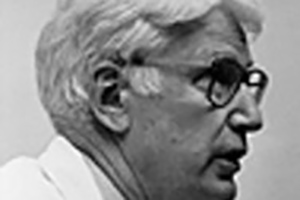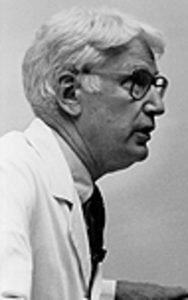Nowell ’48, Lasker Prizewinner for Cancer Chromosome Finding, Dies at 88


Acclaimed cancer researcher Dr. Peter Nowell ’48, the Gaylord P. and Mary Louise Harnwell Emeritus Professor and former chair of the Department of Pathology and Laboratory Medicine at the Perelman School of Medicine, died Dec. 26, 2016, of complications from Alzheimer’s disease. He was 88.
A biology and chemistry major at Wesleyan, Nowell earned his medical degree from the University of Pennsylvania’s Perelman School of Medicine in 1952. He joined the faculty in 1956 as a member of the Department of Pathology and Laboratory Medicine, later serving as chair. He was also the first director of the University of Pennsylvania Cancer Center, now known as the Abramson Cancer Center at the University of Pennsylvania.
In 1960, Nowell and colleague David Hungerford, then a graduate student working at the Fox Chase Cancer Center’s Institute for Cancer Research, “made a startling observation that the number 22 chromosome in the tumor cells of individuals suffering from chronic myelogenous leukemia (CML) was abnormally small,” explains writer Bonnie Cook in the Philly.com obituary for Nowell. “The research broke new ground because it was the first consistent chromosome abnormality found in any kind of malignancy.” This came to be called “the Philadelphia chromosome.”
To put the enormity of the discovery in perspective, New York Times writer Denise Grady spoke to Mark Greene, director of the Immunobiology and Experimental Pathology Division at the Perelman School of Medicine at the University of Pennsylvania, who told her that, back in this era, “The notions of cancer were so bizarre. It was a total conundrum. There was no consistent theory at that time that was even recognized.”
“The finding,” wrote Grady, “published in 1960, took cancer research in a new direction, leading to an extraordinary advance by other scientists three decades later: the drug Gleevec. For many patients, Gleevec transformed chronic myeloid leukemia from a fatal disease to a chronic one that can be kept under control for many years.”
In 2007, Nowell reflected on his work in a paper published in the Journal of Clinical Investigation, “Discovery of the Philadelphia Chromosome: A personal perspective.” Nowell’s son, Michael, told Philly.com writer Cook, “He lived long enough to see it developed into treatment to allow individuals to lead longer lives.”
Nowell was named a Distinguished Alumnus of Wesleyan in 1968. Among the many other honors and awards Nowell received were the Lindback Distinguished Teaching Award, the 1998 Albert Lasker Clinical Medical Research Award (often called “the American Nobel Prize”), and the Benjamin Franklin Medal in Life Science. He served on Wesleyan’s Board of Trustees for 15 years and was elected trustee emeritus of the university.

